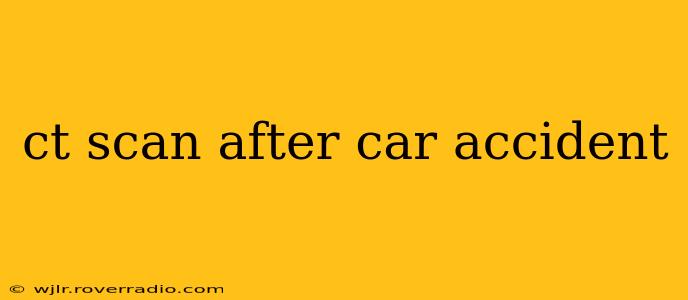A car accident can be a terrifying experience, leaving you shaken and potentially injured. One of the first steps in assessing the extent of your injuries after a car accident is often a CT scan. But when is a CT scan necessary, and what should you expect during and after the procedure? This comprehensive guide will answer these questions and more.
Why Would a Doctor Order a CT Scan After a Car Accident?
A CT (computed tomography) scan uses X-rays and a computer to create detailed cross-sectional images of your body. Doctors order CT scans after car accidents to identify internal injuries that might not be immediately apparent. These injuries can include:
- Head injuries: Concussions, skull fractures, brain bleeds (hemorrhages), and other traumatic brain injuries (TBIs). A CT scan is crucial for detecting these life-threatening conditions.
- Spinal injuries: Fractures, dislocations, and damage to the spinal cord. Early detection of spinal injuries is vital to prevent permanent disability.
- Chest injuries: Collapsed lungs (pneumothorax), bleeding in the chest cavity (hemothorax), and rib fractures.
- Abdominal injuries: Internal bleeding, organ damage (spleen, liver, kidneys), and bowel perforations.
- Pelvic injuries: Fractures and internal bleeding.
- Facial fractures: Broken bones in the face, often requiring specialized treatment.
What Happens During a CT Scan?
The CT scan procedure itself is relatively quick and painless. You'll lie on a table that slides into a large, donut-shaped machine. The machine rotates around you, taking X-ray images from multiple angles. You may be asked to hold your breath for short periods during the scan. The entire process typically takes only a few minutes. In some cases, an intravenous (IV) contrast dye may be injected to enhance the visibility of certain structures. This dye is generally safe, but you should inform your doctor of any allergies you might have.
What if I Don't Want a CT Scan?
While CT scans are generally safe, they do involve exposure to ionizing radiation. If you have concerns about radiation exposure, discuss them with your doctor. They can weigh the risks and benefits of the scan against your specific situation. Alternative imaging techniques, such as X-rays or MRI scans, might be considered in certain cases, though they may not provide the same level of detail. Remember, your doctor's recommendation is based on the need to accurately assess your injuries and ensure your safety.
How Long Does it Take to Get CT Scan Results After a Car Accident?
The time it takes to receive your CT scan results varies depending on the facility and the urgency of the situation. In emergency situations, results are often available within minutes. In non-emergency settings, you may need to wait a few hours or even a day. Your doctor will explain when you can expect to receive the results and discuss them with you.
What if the CT Scan Shows Injuries?
If the CT scan reveals injuries, your doctor will discuss the findings with you and recommend an appropriate course of treatment. This may involve medication, surgery, physical therapy, or a combination of therapies. The severity of your injuries and your overall health will influence the treatment plan.
What are the potential risks of a CT scan?
While generally safe, CT scans do carry some risks, primarily exposure to ionizing radiation. The amount of radiation exposure is relatively low, but it's still important to consider, especially for pregnant women or people who undergo frequent CT scans. Allergic reactions to contrast dye are also possible, though rare. Your doctor will discuss these risks with you before the procedure.
How much does a CT scan cost after a car accident?
The cost of a CT scan after a car accident varies depending on your insurance coverage, the location of the facility, and the specific services provided. It's important to check your insurance policy and understand your out-of-pocket expenses. Your healthcare provider's billing department can provide a more accurate estimate.
This information is for educational purposes only and should not be considered medical advice. Always consult with a healthcare professional for any health concerns or before making any decisions related to your health or treatment.
